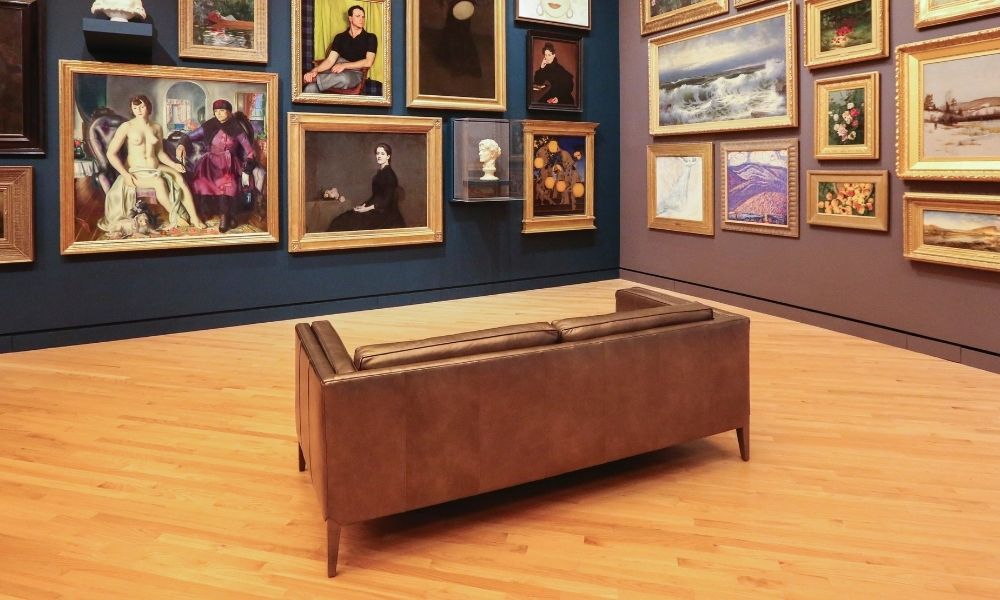
This post is part of the Spotlight series on Voices of Movers and Shakers, a series showcasing reflections from scholars of the Mastercard Foundation Programme on the intersections between learning, activism, race, and belonging. In his post, Brindley J Fortuin a PhD student at the University of Edinburgh, Centre of African Studies provides a personal reflection on the power of representation, art and political activism as a space of imagining and resistance. You can also listen to Brindley talk about his writing process with Mastercard Scholars Program Director Johanna Holton on the Teaching Matters Podcast…
One day a former partner and I walked through the Scottish National Portrait Gallery and an image struck me. It was an image of an interracial, mature gay couple. As I was standing there, gazing at the portrait I exclaimed to my ex ‘This is profound!’. Until that day I have never seen an image of an interracial, mature, gay couple. This sense of awe completely took me by surprise. I am a Queer activist and an aspiring academic who has experimented with art-based research practises before. Acknowledging the power of art is part of me. Yet, that day, I experienced the liberating power of art most peculiarly. My ex-partner was white and as he led me to the staircase in the gallery, he asked me to share my thoughts. I am not surprised that he did not have the same reaction. Fundamentally, art appeals to our senses, senses which are cultural, political and economically honed. In his case, he is white and was raised in the UK. He has seen the diversity of queer couples. I, on the other hand, was born and raised in South Africa. A country where lesbians, gays and transgender persons are still being killed and violated, irrespective of our constitutional protections. Yet, both of us stood in one of the UK’s most impressive galleries looking at an interracial, mature gay couple. As we left the gallery he remarked “This is why representation matters”. I could only smile and realised that I would one day return to this experience and think through why that image moved me as it did.
I am always critical of this idea of “representation matters”. Of course, representation matters, but I have encountered black and queer persons in power who exert the same violence that we fight against. The messiness of white feminism rings true with this observation. Yet, when I looked at that image, I understood why representation is important. I suddenly became the black little girl who for the first time sees a black woman on a magazine cover. In that image, I saw a reality. I realised that could be me or any other queer person for that matter. Up until then, I have not even fantasised (or theorised) about the prospect of ‘growing old’ together. When you are black, queer and without intergenerational wealth, such fantasies are short-lived and crushed by the reality of existence. The portrait gave me hope. Naturally, my relationship ended shortly after our encounter with the image and the world was hit by a pandemic. Our already strained, debt-ridden, poverty-stricken, racist, unequal and violent world was, well, violently disrupted.
Similarly we humans disrupt in many different ways. My slave ancestors could only imagine that an African like them would be crossing the seas, voluntarily, and non-violently. Yet, their imaginations of freedom and their labour to transform their imaginations into reality is the real reason I can walk as equals anywhere in the world. One of the most vital realisations, as I have gathered from moving between spaces in South Africa, the United States of America and the United Kingdom, was that being present is powerful. The image was present, and I was present. However, presence is not always enough. In many respects ‘being present’ is the precursor to action. I might have had a life-changing encounter in a gallery, yet the warmth and hope that the image induced stopped with me and my relatively comfortable and safe lifestyle in the UK. In June 2020, an acquaintance was murdered in a hate-crime in South Africa. They were queer. They do not get to grow old and have their portrait framed for other black queer persons to find joy in. Thus, I needed to return to the example of my slave ancestors. Now, I am using the idea of ‘being present’ as a space of ‘imagining’. Many queer activists are doing exactly that. They write books, make music, paint, educate, heal, and defend. Their labour is not exclusively found in global pride marches but in the safe houses they operate, the informal Facebook groups and their protests. They disrupt discriminatory HR processes, they take governments to court, they run for the elections-and win, they start grassroots organisations that will never receive funding or a Nobel Prize. In violent states like Uganda, they hide each other when police or family members hunt them down. We pray for each other, rally financial support for transition surgeries and we set up peer-support groups. We have Queermas (Christmas) for those of us who have families that deny our existence but would rather believe in Father Christmas and mistletoes.
We weep when we see reports of queer people dying, we laugh and celebrate when they get married or start a family. These are the ways we choose to be present, move, imagine and resist or subvert the structures that deny us a dignified human life.
 Brindley J Fortuin
Brindley J Fortuin
Brindley is a PhD student at the University of Edinburgh, Centre of African Studies. His current research and activism are situated between the intersections of LGBTIQA+ rights, race and religion. Born in Cape Town, he completed his undergraduate degree in Politics, Sociology and Religion and completed his Honours in Sociology at the University of Cape Town, South Africa
Twitter: @FortuinBrindley


This is powerful. Great work Brindley, thank you for sharing.
Thanks for sharing another thought-provoking and powerful piece of writing, Brindley…and sending love from Cape Town!